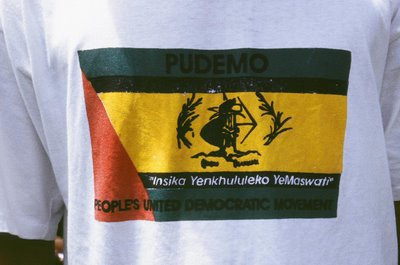When PUDEMO was born
Letter to the Editor
Zakhele Mabuza
Information and Publicity-PUDEMO
Swazi Times July 11, 2008
Sir,
The month of July is a significant period for it marks the birth of the Peoples United Democratic Movement (PUDEMO) founded in 1983-a few months after the death of King Sobhuza II.
This was followed by heightened repression in the country orchestrated by the Supreme Council of State, Liqoqo. There was infighting in the palace, xenophobia and collusion with apartheid South Africa that resulted in detention without trial and police brutality. It was against such a background that some patriotic Swazis, including university students and workers, resolved to form this organisation with the broad aim of challenging the oppression and iron rule meted by the Liqoqo on the people of this country.
PUDEMO seeks to unite the people of this country in the struggle for constitutional multiparty democracy. The conditions of poor governance that existed in the inception of PUDEMO still exit in the present context. Swaziland is still run as a private entity (farm).
Committed
Corruption has become part of our culture and the government cannot do anything as they are part of the whole mix. Very little resources are committed on health, agriculture and education. Education has become very expensive, the country has gone hungry and the health system has virtually collapsed.
The provision of social services is very poor and at times is done as a favour to the governed. The elderly grant is so low and meaningless. The challenges faced by the people under the Tinkhundla System of Governance are countless and are by deliberate human design.
The status quo and people threatened by PUDEMO’s call for constitutional multiparty democracy have spread a lot of misinformation about the organisation. They have said that PUDEMO is anti-monarchy and anti-tradition.
All that PUDEMO seeks is a just political system under constitutional multiparty democracy that will guarantee the people of this country democracy, accountability, transparency and social security. We so much want to see Swaziland become a giant of democracy in the global stage.
PUDEMO is not anti tradition, but does not take kindly to the trend that sees culture being used as a political tool to oppress and indoctrinate the people of this country.
PUDEMO has always called for the drafting of a national constitution that will guarantee proper mechanisms for governance and a bill of rights with the involvement of all stakeholders. A very viable, transparent and all inclusive process was put forward by PUDEMO to the government of the day as early as 1992. However, being anti political pluralism the government deliberately refused to adopt the proposed strategy.
Entrenchment
Instead they short circuited this process and went the vusela, CRC and CDC route that ensured the end product would guarantee the entrenchment of the status quo in the form of the present document that is called a national constitution.
We reject this document for it does not truly represent the aspirations for a future Swaziland that is governed democratically and transparently.
The election structure under the existing status quo is deliberately designed to produce a legislature and an executive that does not have powers to independently and honestly discharge their duties.
These officers are then rewarded for agreeing to play politics, be errand boys and girls.
PUDEMO wants an election process that will provide people with real power and be able to formulate policies and implement them. This is the constitutional multiparty democracy we are calling for.
We believe the Tinkhu-ndla System of Governance and its election process is meant to promote individualism as opposed to collectivism (a clear divide and rule strategy). What can an individual without a political constituency do in Parliament and in the executive to promote good governance?
Individuals will be forever grateful to the masters of the political system for allowing them time to continue receiving benefits and privileges which are very scarce for the ordinary Swazi in the streets, slums and rural areas.
Zakhele Mabuza
Information and Publicity-PUDEMO
Friday, July 11, 2008
Subscribe to:
Post Comments (Atom)

No comments:
Post a Comment